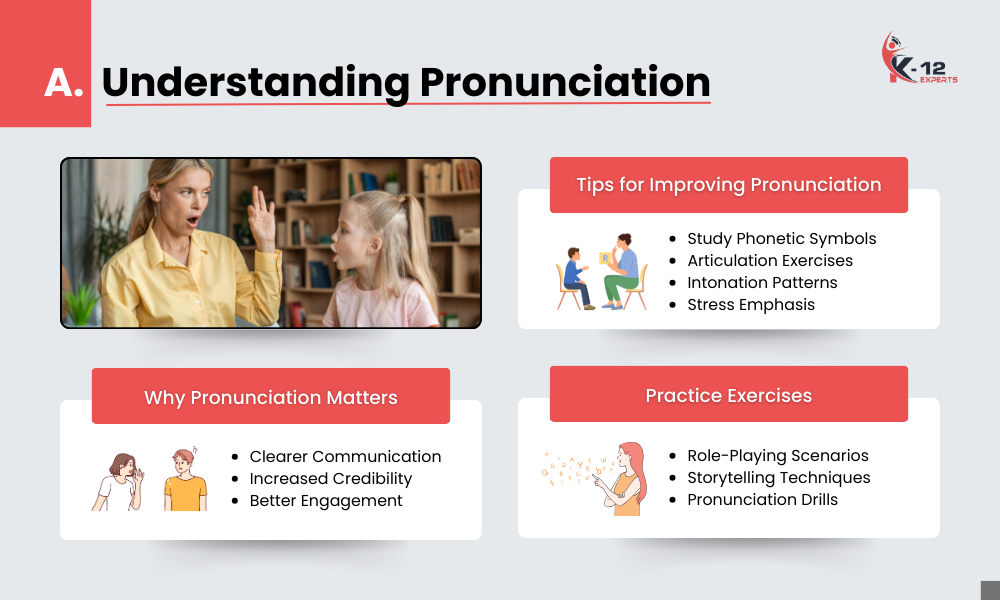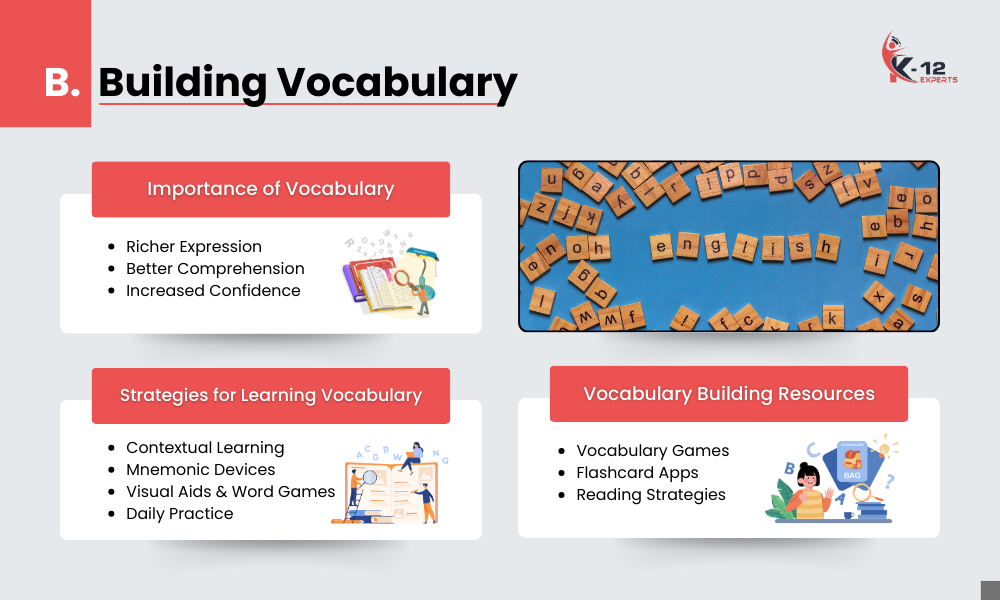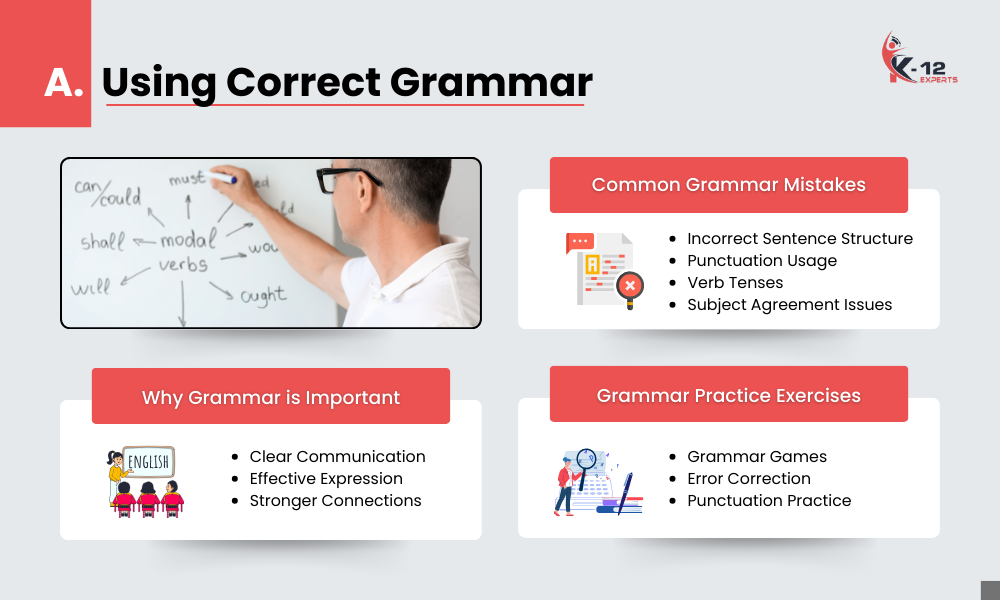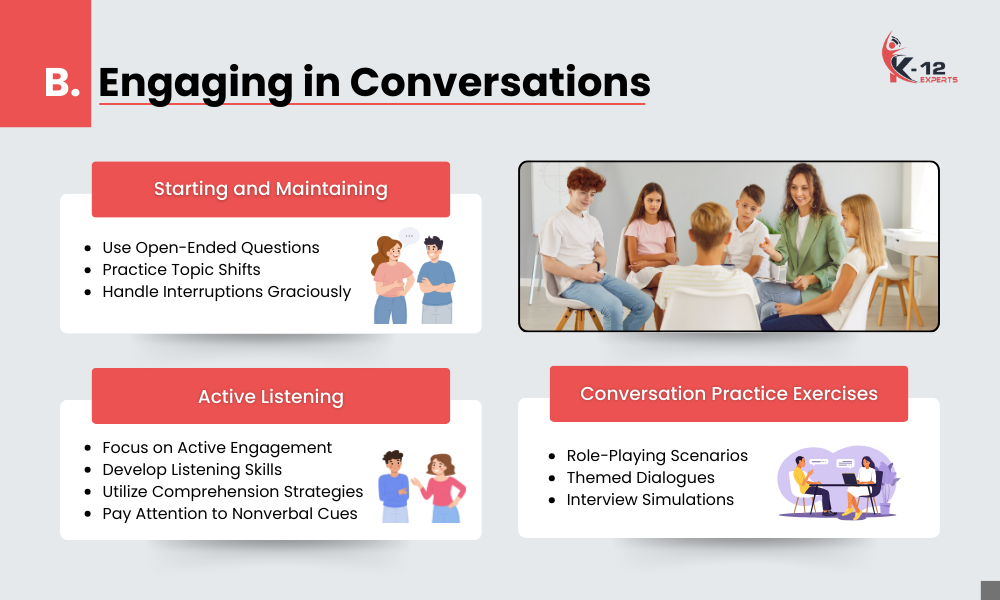It’s no coincidence that you’re seeking to improve your English speaking skills at a time when global communication is more vital than ever. As you endeavor to express yourself with confidence, you’re likely aware that speaking English fluently can greatly enhance your personal and professional relationships. You’ve already taken the first step by acknowledging the importance of effective communication. Now, you’re poised to discover the essential strategies that will help you build a strong foundation in English. But what are the key elements that will take your language skills to the next level?
Highlights
- Mastering good pronunciation enhances speech clarity, increases credibility, and boosts engagement through phonetic exercises and intonation techniques.
- Building a broader vocabulary enables nuanced expression of ideas and emotions, aids comprehension, and increases confidence in conversations.
- Using correct grammar facilitates clear and accurate expression of thoughts, conveys emotions effectively, and builds trust with the audience.
- Engaging in conversations through regular practice, active listening, and feedback incorporation fosters growth in conversational skills and fluency.
- Consistent practice exercises, such as role-playing scenarios and themed dialogues, help build confidence and develop conversational skills in English.
Setting the Foundation
As you work on setting the foundation for speaking English with confidence, you should focus on two key areas: understanding pronunciation and building vocabulary.
By mastering these fundamentals, you’ll establish a strong base that will help you communicate effectively and accurately in English.
In this section, you’ll learn practical tips and strategies for improving your pronunciation and expanding your vocabulary so you can express yourself clearly and confidently.
A. Understanding Pronunciation

As you work on building your English skills, it’s crucial to understand that pronunciation plays a huge role in effective communication.
By focusing on proper pronunciation, you’ll be able to convey your message more clearly and confidently, and others will be more likely to understand you.
In this section, you’ll learn why pronunciation matters, receive actionable tips to improve your pronunciation and have the opportunity to practice with exercises designed to help you speak English with greater confidence.
Why pronunciation matters
Mastering the correct pronunciation of English words is essential to effective communication because when you speak clearly and accurately, you convey confidence and authority to your listeners. Your pronunciation impact is significant, as it can make or break the message you’re trying to convey.
Here are three reasons why pronunciation matters:
- Clear communication: Good pronunciation promotes speech clarity, ensuring your message gets across.
- Increased credibility: Accent influence can make or break your authority on a subject.
- Better engagement: Phonetic exercises and intonation techniques can make your speech more engaging and interesting to listen to.
Tips for improving pronunciation
To improve your pronunciation, you’ll often need to start by understanding the individual sounds of English, a process that requires recognizing the nuances of phonetics and phonology.
Study phonetic symbols to master articulation exercises and develop accurate intonation patterns and stress emphasis.
This foundation will help you achieve accent reduction and confidently communicate in English.
Practice exercises
Once you’ve developed a solid understanding of phonetics and phonology, you can start practicing exercises that target specific sounds, intonation patterns, and stress emphasis to improve your English pronunciation.
Engage in:
- Role-playing scenarios: Practice conversational skills and receive peer feedback.
- Storytelling techniques: Use language games and pronunciation drills to enhance your speech.
- Pronunciation drills: Target specific sounds and intonation patterns for precise speech.
B. Building Vocabulary

As you work on building your vocabulary, you’ll start to notice a significant improvement in your ability to express yourself in English.
You’ll learn to choose the right words to convey your intended meaning, and your confidence will grow with each new word you master.
Importance of vocabulary
Expanding your vocabulary is an essential step in building a strong foundation for confident English speaking, as it allows you to express yourself more accurately and effectively.
You’ll sound more natural and fluent when you learn vocabulary in context through thematic vocabulary, word associations, and idiomatic expressions.
Here are three key aspects:
- Richer expression: A broader vocabulary lets you convey nuanced ideas and emotions.
- Better comprehension: Knowing more words helps you understand others more accurately.
- Increased confidence: A strong vocabulary boosts your self-assurance in conversations.
Strategies for learning vocabulary
By incorporating effective strategies into your daily routine, you’ll accelerate your vocabulary growth and develop a strong foundation for confident English speaking.
Use contextual learning by reading and listening to English materials.
Create mnemonic devices to associate words with memories and utilize visual aids like flashcards.
Engage in word games and commit to daily practice to reinforce new words.
Vocabulary building resources
You’ll find numerous resources at your disposal to help build your vocabulary, from online tools and mobile apps to books and language exchange programs. Utilize these to boost your vocabulary:
- Vocabulary games: Engage with interactive games that test word associations and context clues.
- Flashcard apps: Create digital flashcards to review words on the go.
- Reading strategies: Apply active reading techniques to infer word meanings.
Speaking with Confidence
As you work on speaking English with confidence, you’ll want to focus on two key areas: using correct grammar and engaging in conversations.
By mastering the rules of grammar, you’ll be able to express yourself clearly and effectively, while participating in conversations will help you develop the skills to think on your feet and respond with confidence.
In this section, you’ll learn practical tips and strategies to improve your grammar and conversation skills, empowering you to communicate in English with poise and self-assurance.
A. Using Correct Grammar

As you work on speaking English with confidence, you’ll want to make sure you’re using correct grammar to get your point across effectively.
You’ll avoid confusing your listeners and convey your message more clearly when you steer clear of common mistakes that can make a big difference in how well you’re understood.
Why grammar is important
Mastering correct grammar is essential for speaking English with confidence, as it empowers you to convey your intended message effectively and avoid misunderstandings.
By grasping grammar rules and applications, you’ll debunk common misconceptions and reveal valuable resources.
Here’s how grammar impacts your English speaking skills:
- Clear Communication: Grammar helps you express your thoughts clearly and accurately.
- Effective Expression: Grammar rules enable you to convey emotions, tone, and attitudes.
- Stronger Connections: Grammar influence helps build trust and rapport with your audience.
Common grammar mistakes
One major obstacle to speaking English with confidence is making frequent grammar mistakes, which can undermine your credibility and hinder effective communication.
You can overcome this hurdle by being aware of common errors, such as incorrect sentence structure, punctuation usage, and verb tenses, as well as subject agreement issues.
Mastering these basics will enhance your speaking skills and boost your confidence.
Grammar practice exercises
Practicing grammar through targeted exercises is a crucial step in building your speaking confidence. This approach allows you to reinforce new language habits and develop a more intuitive sense of correct grammar usage.
As you engage in these exercises, you’ll become more comfortable with grammar rules, verb tenses, and sentence structure.
Try these exercises:
- Grammar games: Engage in interactive games that test your grammar skills.
- Error correction: Identify and correct errors in sentences to improve your grammar.
- Punctuation practice: Practice using punctuation marks correctly in sentences.
B. Engaging in Conversations

Now that you’re more comfortable with using correct grammar, it’s time to put your skills into action by engaging in conversations.
You’ll make significant progress in speaking English with confidence when you learn how to start and maintain a conversation, focus on active listening, and practice conversation exercises regularly.
Starting and maintaining a conversation
To engage effectively in conversations, you need to develop the skills to start and maintain discussions with confidence. This involves being prepared to initiate, respond, and adapt to different topics and situations.
Mastering icebreaker techniques and conversation starters will help you begin with ease. Here are key strategies:
- Use open-ended questions: Encourage sharing and exploration.
- Practice topic shifts: Smoothly change between subjects.
- Handle interruptions graciously: Stay calm and refocus.
Active listening
Your ability to listen actively is just as essential to confident conversation as speaking, as it allows you to respond thoughtfully and build meaningful connections with others.
By focusing on active engagement, developing your listening skills, and utilizing comprehension strategies, you’ll create effective feedback loops.
Pay attention to nonverbal cues, and you’ll become a more empathetic and engaging conversationalist.
Conversation practice exercises
Building on your active listening skills, you can further boost your conversational confidence by incorporating targeted practice exercises into your daily interactions.
Try these exercises:
- Role-playing scenarios: Practice different social situations, like ordering food or making a reservation.
- Themed dialogues: Engage in conversations on specific topics, such as hobbies or travel experiences.
- Interview simulations: Prepare for job interviews or practice storytelling exchanges and debate topics.
Frequently Asked Questions
Can Anyone Become a Fluent English Speaker, Regardless of Age?
‘You’re about to discover a surprising truth: age isn’t a barrier to becoming a fluent English speaker. By debunking fluency myths and leveraging age advantages, consistent practice, and supportive learning environments, you can access successful language acquisition.’
How Do I Find Native English Speakers to Practice With?
You’ll easily find native English speakers to practice with by joining online language communities, attending local conversation clubs, or using social media platforms and language learning apps; also, participate in cultural exchange events to connect with native speakers.
What if I’m shy and feel embarrassed speaking English?
You’re taking a huge step by facing your shyness head-on. Use practice techniques like recording yourself, and boost confidence with positive affirmations; surround yourself with supportive environments, and you’ll be overcoming shyness in no time.
Are Accent Reduction Classes Worth the Investment?
You’re considering accent reduction classes, but are they worth the investment? With 71% of global businesses valuing accent-free communication, it’s an essential skill. Benefits of classes, like online vs offline options and personal success stories, far outweigh the cost, boosting your value in the job market.
Can I Learn to Speak English Confidently Without a Language Exchange Partner?
You can definitely learn to speak English confidently without a language exchange partner by leveraging self-study techniques, online resources, and speech practice tools while incorporating confidence-building listening exercises into your daily routine.
Conclusion
You’ve laid the groundwork for confident English speech; now it’s time to reap the rewards.
By embracing these strategies, you’ll find your voice, figuratively and literally.
As the ancient Greek proverb goes, ‘We are what we repeatedly do’ – with consistent practice, you’ll become the master of your linguistic destiny, effortlessly steering through conversations and forging meaningful connections.
Keep honing your skills; your voice will echo with confidence, clarity, and conviction.




